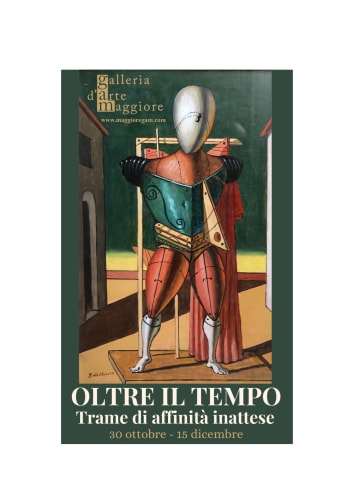Galleria d’Arte Maggiore g.a.m. presents, in its historic Bologna venue, the exhibition "Beyond Time. Threads of Unexpected Affinities", a journey through more than a century of artistic research, establishing a dialogue between the great masters of the Twentieth century and several leading figures from the international contemporary scene. The exhibition layout abandons simple chronological or stylistic criteria, following instead a principle of connection and resonance: the works converse with one another in a fluid space, where materials, signs and gestures intertwine in a path of visual and conceptual correspondences, inviting the viewer to personally recompose a web of meanings that transcends time eras and categories.
An essential starting point is Giorgio Morandi, featured in a powerful dialogue with Ettore Spalletti, already successfully celebrated in an exhibition in 2014. As Francesco Bonami wrote upon the passing of the minimalist master in 2019: “But the Spalletti I remember the most is the one I saw a few years ago in Bologna at Galleria d'Arte Maggiore, where his works were placed alongside those of Morandi, another local genius who had discovered a universe in the simplicity of things. Morandi's bottles and Spalletti's spaces were like voices in a duet between two sopranos. Lightness and power. Two qualities that only a few great masters have been able to create and control in the history of art”. Further echoes of Morandi resonate in other rooms of the gallery, as i n Luigi Ontani's sculpture Tavolino extrametafisico (2015), which reinterprets the objects of Morandi's still lifes in a new space, with irony and quotation.
Among the great masters of the Twentieth century, the exhibition also presents Giorgio de Chirico, with important historical paintings (I gladiatori, 1928) and metaphysical works (Trovatore, 1963) as well as the sculpture Orfeo (based on a 1970 original model), shown in a surprising but successful pairing with the sculptures of Fausto Melotti. In De Chirico, we find metaphysical tension and stillness; in Melotti, spiritual balance and rhythm. Yet both artists lead us through a mental experience where time is freed from chronology.
A space of suspension that harmonizes with the three-dimensional creations in silk paper and Japanese paper by Claudine Drai, a French artist whose works have recently entered the prestigious permanent collection of the Centre Pompidou in Paris. Her light figures, between presence and absence, inhabit a time that is still yet generative, as though we were witnessing the silent genesis of a world that is about to be born and never ceases to begin. An active silence also found in the white backgrounds of the works by Sam Francis and Paul Jenkins: we are not facing a void but a space that engages in a dynamic dialogue with the controlled explosion of color, which appears fluid in both artists, in contrast to Untitled (Spin Drawing, 2003) by Damien Hirst, where color becomes system, rhythm, control.
The exhibition also explores how a single artistic movement has been interpreted differently depending on the geographical context. Art Informel is presented through the lens of American Abstract Expressionism in Franz Kline and its European interpretation tin the research of Toti Scialoja. The British Pop Art by Allen Jones – which plays with the body and provocation, challenging social conventions with conceptual results and sharp irony – is compared with the American Pop Art of Tom Wesselmann – who transforms objects and nudes into stylized icons, as in Maquette for Bedroom Blonde Doodle Variation (3D) (Black) (1986). Surrealism, too, is represented in its many facets: Meret Oppenheim with the paradox and poetic transformation of everyday objects, as in the iconic Souvenir du “Déjeneur en fourrure” (1970); Renè Magritte, who subverts logical conventions through visual and conceptual illusions, and Roberto Sebastian Matta's sculptures, which bring his cosmic and dreamlike visions into three-dimensional space.
Finally, the exhibition gives space to some of the most compelling contemporary voices in Italy, where matter becomes a poetic and tactile element. Among them: Nino Longobardi, whose research ventures into a zone suspended between trace and memory, using resins, earths, paper and objects directly inserted into the canvas, as in the large work Untitled (2001); Davide Benati, who entrusts his refined oils and watercolors to Tibetan paper, known for its lightness, translucency, and surface irregularities, evoking the spiritual and artisanal dimension of the places where it is produced. Contemporary outcomes of a material-focused investigation that has illustrious precedents, such as the oil and tar on masonite by Piero Manzoni (Untitled, 1957), which challenges traditional painting by turning matter into an active, protagonist element.
The exhibition closes with Mattia Moreni, with a work from the “Humanoids” series that established the artist as an authentic visionary who intuited the impact of technology and computer science on our daily lives, anticipating today's debate on artificial intelligence and making his work among the first to confront the innovations of our time.
The exhibition reveals itself as a visual and mental experience that invites us to think of art not as a sequence of movements, but as a network of relationships, where artworks call to, contradict, and complete one another.
Artists on view, in alphabetical order:
Davide Benati, Giorgio de Chirico, Filippo de Pisis, Claudine Drai, Sam Francis, Damien Hirst, Paul Jenkins, Allen Jones, Franz Kline, Nino Longobardi, Renè Magritte, Piero Manzoni, Roberto Sebastian Matta, Fausto Melotti, Giorgio Morandi, Mattia Moreni, Zoran Music, Luigi Ontani, Meret Oppenheim, Toti Scialoja, Ardengo Soffici, Ettore Spalletti, Tom Wesselmann.











